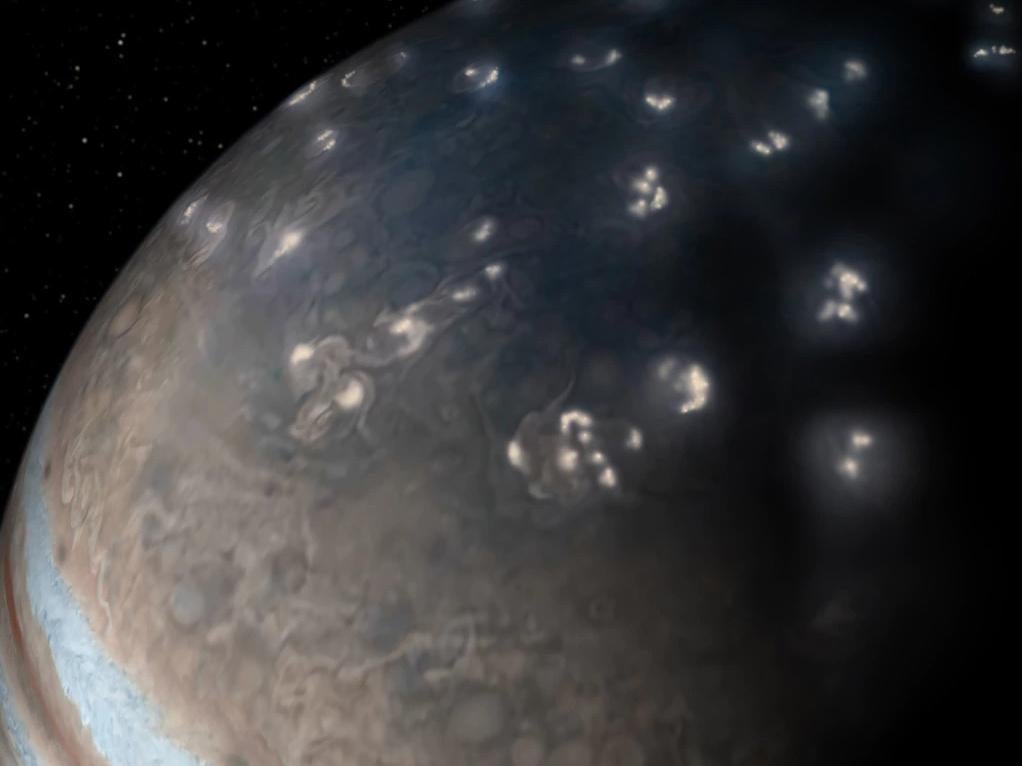The Independent's journalism is supported by our readers. When you purchase through links on our site, we may earn commission.
Lightning storms discovered on Jupiter surprisingly similar to those on Earth
New findings based on Juno spacecraft data challenge 'Jovian lightning' readings taken by Voyager 1

The mysteries of outer space thunderstorms have been unravelled using data obtained from a distant probe orbiting Jupiter.
Scientists have predicted so-called “Jovian lightning” for centuries, and these predictions were confirmed in 1979 when Voyager 1 recorded it in 1979.
However, while the readings taken by the Nasa spacecraft from Jupiter were definitely lightning, scientists noted that it appeared very different to the thunderstorms seen on Earth.
Now, in a new paper published in the journal Nature, scientists from Nasa’s Juno mission found that actually Jupiter’s storms are remarkably similar to our own.
This discovery was supported by a second Nature paper published by a team at the Czech Academy of Sciences, which presented the largest known collection of lightning recordings from the giant planet.
"No matter what planet you're on, lightning bolts act like radio transmitters – sending out radio waves when they flash across a sky," said Dr Shannon Brown of Nasa’s Jet Propulsion Laboratory, lead author of the first paper.
"But until Juno, all the lightning signals recorded by spacecraft were limited to either visual detections or from the kilohertz range of the radio spectrum, despite a search for signals in the megahertz range.
“Many theories were offered up to explain it, but no one theory could ever get traction as the answer."
As Juno flew close to the planet in 2016, it used its array of highly sensitive instruments to record emissions from the gas giant.
In the first fly-by, the craft recorded 377 lightning discharges with megahertz readings comparable with those found on Earth.
Jupiter’s similarity to our home planet was confirmed by the second study, led by Dr Ivana Kolmašová, which found a similar rate of lightning strikes to those found in thunderstorms on Earth.
Dr Kolmašová and her team produced the largest database of lightning-generated low-frequency radio emissions around Jupiter, known as “whistlers” due to the noise they make.
This set of over 1,600 signals, which were also collected using instruments from Juno, showed rates of lightning strikes six times higher than the peak values detected by Voyager 1.
At the same time, while in many respects the researchers confirmed that Jovian lightning is remarkably similar to that observed on Earth, they also noted differences in its distribution.
"Jupiter lightning distribution is inside out relative to Earth," said Dr Brown.
"There is a lot of activity near Jupiter's poles but none near the equator. You can ask anybody who lives in the tropics – this doesn't hold true for our planet."
This effect is thought to result from differences in heat distribution across the two planets.
Warm, moist air rising from Earth’s equator fuels thunderstorms around the planet’s middle, whereas the same effect on Jupiter is created by warm gases from Jupiter's interior rising at the poles due to their lack of atmospheric stability.
"These discoveries could only happen with Juno," said Dr Scott Bolton, principal investigator of Juno from the Southwest Research Institute, San Antonio.
"Our unique orbit allows our spacecraft to fly closer to Jupiter than any other spacecraft in history, so the signal strength of what the planet is radiating out is a thousand times stronger."
Join our commenting forum
Join thought-provoking conversations, follow other Independent readers and see their replies
Comments
Bookmark popover
Removed from bookmarks